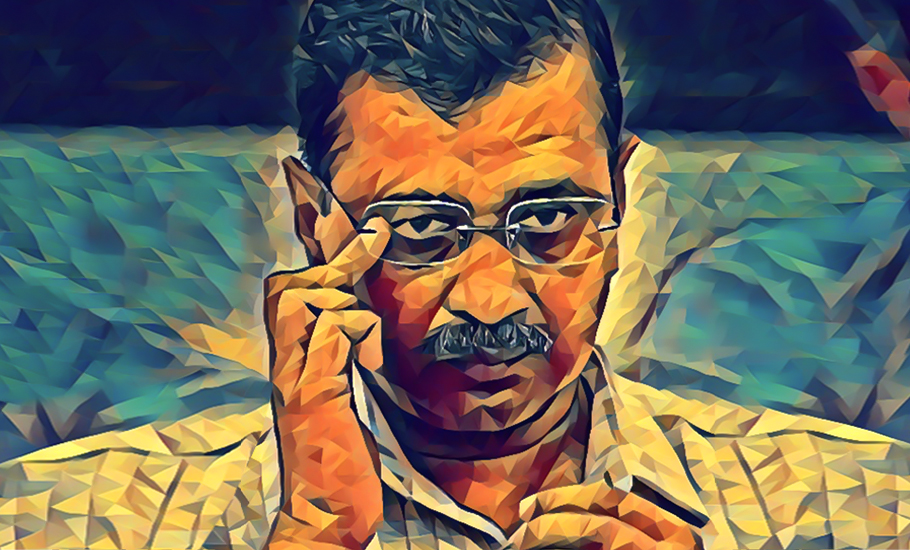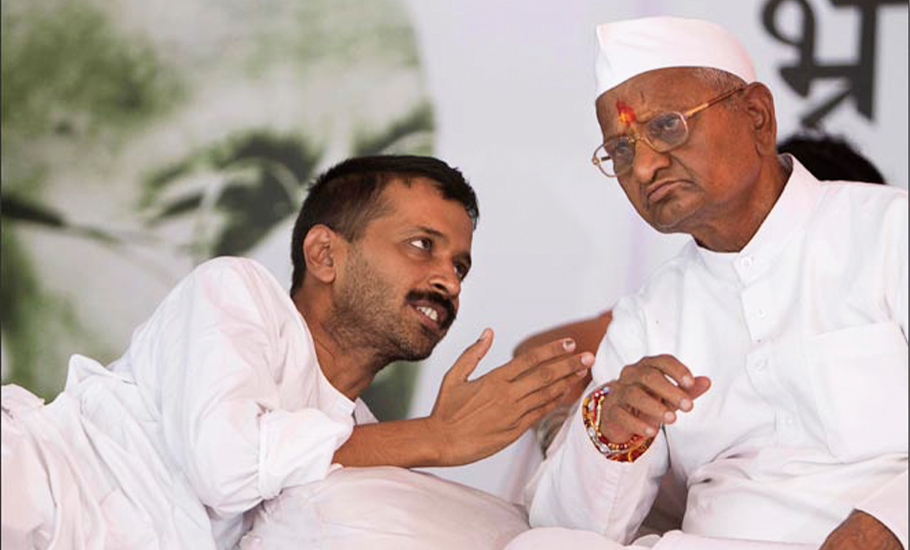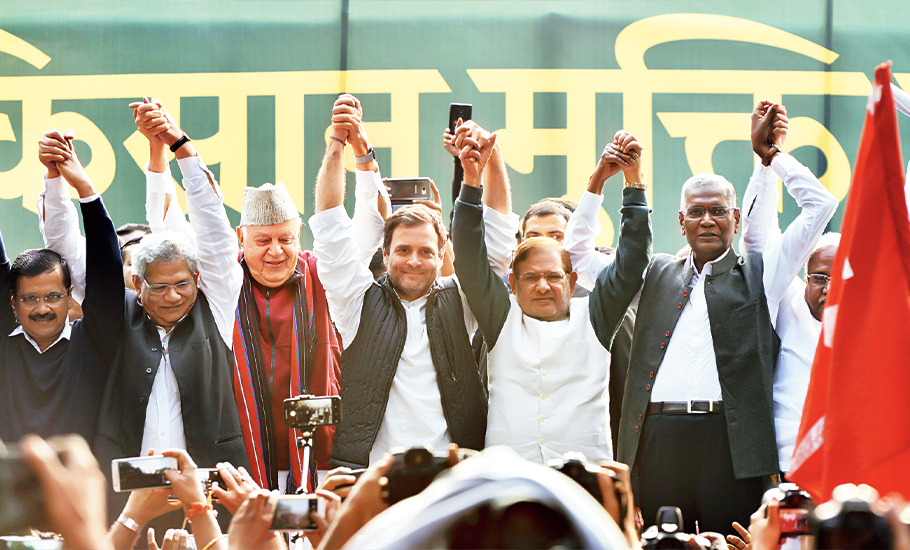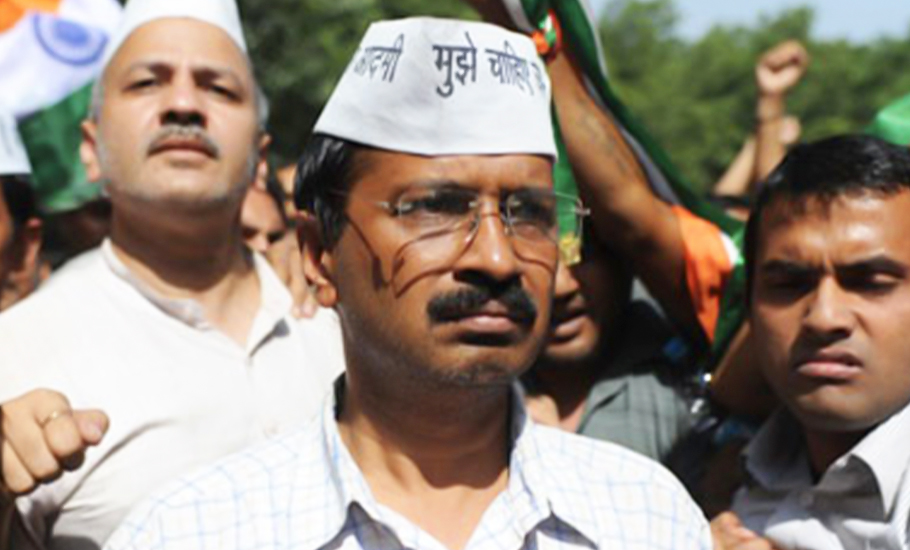
- Home
- News
- Analysis
- States
- Perspective
- Videos
- Education
- Entertainment
- Elections
- World Cup 2023
- Features
- Health
- Business
- Series
- Economy Series
- Earth Day
- Kashmir’s Frozen Turbulence
- India@75
- The legend of Ramjanmabhoomi
- Liberalisation@30
- How to tame a dragon
- Celebrating biodiversity
- Farm Matters
- 50 days of solitude
- Bringing Migrants Home
- Budget 2020
- Jharkhand Votes
- The Federal Investigates
- The Federal Impact
- Vanishing Sand
- Gandhi @ 150
- Andhra Today
- Field report
- Operation Gulmarg
- Pandemic @1 Mn in India
- The Federal Year-End
- The Zero Year
- Premium
- Science
- Brand studio
- Home
- NewsNews
- Analysis
- StatesStates
- PerspectivePerspective
- VideosVideos
- Entertainment
- ElectionsElections
- Sports
- Loading...
Sports - Features
- BusinessBusiness
- Premium
- Loading...
Premium

Will the real Arvind Kejriwal stand up?

From the anarchist greenhorn politician who revelled in branding all politicians and political outfits as corrupt when he floated the Aam Aadmi Party (AAP), riding on the mass hysteria triggered by Anna Hazare’s India Against Corruption (IAC) movement, to a pragmatist who now realises the importance of having allies in politics, Delhi CM Arvind Kejriwal has come a long way. Yet, to those...
From the anarchist greenhorn politician who revelled in branding all politicians and political outfits as corrupt when he floated the Aam Aadmi Party (AAP), riding on the mass hysteria triggered by Anna Hazare’s India Against Corruption (IAC) movement, to a pragmatist who now realises the importance of having allies in politics, Delhi CM Arvind Kejriwal has come a long way. Yet, to those who have followed his meteoric rise from that November day in 2012, when he defied Hazare to enter the political arena, Kejriwal’s current avatar is, arguably, the starkest departure from any of his frequently changing personas.
Since the Centre issued an ordinance curtailing the Supreme Court-mandated executive powers of the Delhi government over its bureaucracy, Kejriwal has been on a nationwide tour soliciting support of sundry opposition parties against the controversial decree. Among those he has met are JD-U’s Nitish Kumar, RJD’s Tejashwi Yadav, CPM’s Sitaram Yechury, Trinamool’s Mamata Banerjee, Bharat Rashtra Samithi’s K Chandrasekhar Rao, NCP’s Sharad Pawar, Shiv Sena-UBT’s Uddhav Thackeray, DMK’s MK Stalin and JMM’s Hemant Soren.
Kejriwal’s request for an appointment with Congress president Mallikarjun Kharge and Rahul Gandhi hasn’t been granted, as yet, ostensibly due to resistance from the Grand Old Party’s leaders from Delhi and Punjab, whose electoral careers have been eviscerated by the AAP. This, of course, hasn’t stopped the AAP convener from claiming that he is confident of securing the Congress’ support.

Public memory may, indeed, be short. Yet, anyone who has followed AAP’s political trajectory would recall that a majority of leaders who Kejriwal is now desperately courting are those he has viciously and frequently denounced as corrupt.
That Pawar, Stalin or Tejashwi have readily offered support to Kejriwal’s fight against the ordinance merely shows that politics demands well-timed compromises, made to address larger vested interests of those involved. In the current context, this new found bonhomie evidently stems from the ongoing efforts at uniting a fragmented Opposition against a common political foe – the BJP – ahead of next year’s General Elections. Likewise, Kejriwal’s repeated pleas to the Congress or other regional parties, whose leaders he once demanded should be jailed for corruption, spring from his own frustration at being helpless against the BJP-led Centre’s concerted attempts at emasculating the AAP’s Delhi government of all powers.

In this political bargain, Kejriwal comes across as a politician with multiple alter egos. A former AAP leader who decided to quit politics after his bitter experience with AAP told The Federal that though the AAP had gradually become unrecognisable from the party of alternative politics that it had originally pitched itself to be, Kejriwal’s current manoeuvres should “shame even his most ardent followers”.
“Look at the AAP’s genesis. Who were the parties and leaders that the Anna Andolan fought against? All those scams, 2G, coal blocks, Commonwealth Games… we were pointedly fighting against leaders from Congress, DMK and other parties. You look at videos of that time; Kejriwal was most vocal in demanding the arrest of everyone, from Sonia Gandhi, Sharad Pawar and Lalu Yadav to Sheila Dikshit, A Raja and (Dayanidhi) Maran… today he is begging the same leaders for support… is he telling his supporters that the people they fought against for 10 years were all wrongly accused by him or have they all suddenly become innocent because he needs their help now,” the AAP leader said.
The attacks Kejriwal made in the past against the leaders he is presently trying to cosy up to are too many to recount. The irony of him now proclaiming his respect for these satraps and hailing them as friends and statesmen is obvious but this transformation hasn’t come overnight. The AAP’s constantly changing political narratives in just 11 years are testimony to Kejriwal’s ideological vacillations and fickle convictions that tend to singularly serve his personal ends while countermanding the promise of an alternative politics upon which he built his party.
A glimpse of Kejriwal’s proclivity for “political advancement through deception, hypocrisy and compromise”, says Mayank Gandhi, AAP co-founder who quit the party in 2015, had come within days of AAP’s first electoral victory in the Delhi Assembly polls of 2013 when Kejriwal accepted outside support of eight Congress legislators to be sworn-in as CM for the first time.
Gandhi says this early lapse was “dismissed as an aberration” because the CM craftily sacrificed his government over alleged non-cooperation from the Congress on passing the Jan Lokpal Bill – the legislation for setting up an anti-corruption ombudsman, which was at the core of the Anna Andolan – in the Delhi Assembly.
“The brute majority with which the AAP returned to power in the 2015 Delhi polls gave Kejriwal a larger-than-life persona that subsequently allowed him to get away with graver betrayals of the people’s trust… even after two consecutive landslide victories he has not revived the Jan Lokpal Bill, other promises made by him about declaring the monetary contributions received by AAP on its website, not fielding candidates with criminal antecedents in elections, zero tolerance towards corruption in government, have all been forgotten,” says Gandhi, author of AAP and Down, which details several alleged compromises that Kejriwal and AAP made between 2013 and 2015.
“Is it not ironic that today a party formed on the plank of anti-corruption is battling charges of financial impropriety on a daily basis… two of his closest confidants (recently out-on-bail former ministers Manish Sisodia and Satyendra Jain) were in jail over corruption allegations, Kejriwal also stands accused of graft,” Gandhi said.
A former AAP leader who is now in the Congress told The Federal that though a degree of hypocrisy exists in every political outfit, “Kejriwal is only the second political leader in the country – the first being Narendra Modi – who employs hypocrisy as an ideology… he is a marginally refined version of Modi. He knows the power of passing off populism as righteous politics and the importance of PR and, like Modi, he is entirely self-obsessed.”
The AAP-turned-Congress leader told The Federal, on condition of anonymity, that one area where Kejriwal has, arguably, surpassed Modi is in ensuring that “no wrongdoing can be traced back to him because he holds no portfolio and signs no official document… this is why Manish and Satyendra went to jail though the liquor policy was entirely Kejriwal’s brainchild”.
It is this widely perceived tendency in Kejriwal to hog the limelight and place himself before his party while taking no accountability whenever the AAP finds itself cornered by critics that led to his falling out with most co-founders of the party fairly early on in the AAP’s brief journey. While Kejriwal sacked Yogendra Yadav and Prashant Bhushan for reportedly raising, within the party and outside it, a number of uncomfortable questions about the AAP’s functioning, other co-founders such as Medha Patkar, Anjali Damania, Anand Kumar, Admiral Ramdas, Ashish Khetan and Ashutosh made a quiet exit in quick succession.
Once among Kejriwal’s closest aides, Kumar Vishwas had a bitter and very public falling out with the AAP convener. Serious allegations levelled by Vishwas against Kejriwal subsequent to the former’s departure from the party were brushed aside by the party and even the media as rants of a jilted leader. Vishwas maintains he was “forced out of AAP because I chose to publicly ask Kejriwal questions that nobody else in the party dared to”. Vishwas concedes that his differences with Kejriwal began after he was denied a Rajya Sabha berth but claims that this was only one half of the story.

“What angered me more was the people Arvind chose in my place,” Vishwas said. He claimed that Kejriwal’s decision to ignore him and Ashutosh and instead nominate Sushil Gupta and ND Gupta “who were not even remotely involved with the party till the time they were picked as our candidates shocked everyone”. He alleged that when “some leaders told Arvind that these nominations will lead to questions about AAP selling Rajya Sabha tickets, he told them bluntly – party bhi toh chalani hai, paisa kahaan se ayega (where will the money required to run the party come from), thereby confirming that the tickets were indeed sold”. Allegations of AAP selling Rajya Sabha berths had also surfaced when the party picked businessmen Ashok Mittal and Sanjeev Arora as its candidates from Punjab after its landslide victory in the state last year.
AAP minister and Kejriwal’s close aide Gopal Rai brushes aside all such allegations as being “blatant lies born out of jealousy of those who saw AAP as a vehicle for personal glory but whose vested interests did not succeed because of Arvind Kejriwal”. Rai says “Kejriwal is the AAP’s mascot because the people know he is an honest politician who works 24×7 for them, unconcerned about pressures from every side, including by the Narendra Modi government and the (probe) agencies it misuses to target political rivals.”
What is fascinating though is that despite allegations of rampant corruption within the AAP and the high-profile arrests of Sisodia and Jain, Kejriwal appears to be largely insulated from the taint of financial impropriety. Similarly, despite the AAP’s systematic demolition of every ideal it was founded on – anti-corruption, secular politics, transparency, and decentralisation of power; the party’s hold on Delhi’s voters, or even among its more recently minted electorate in Punjab, hasn’t diminished.
Senior journalist Manoj Mishra, who has covered the Delhi government for decades and observed the AAP closely, believes Kejriwal’s success in surviving one crisis after another lies as much in his “uncanny ability to change narratives and combatively project himself as a victim of conspiracies” as in the “transactional nature of politics that makes his Delhi Model of freebies act as his impenetrable armour”.
“Kejriwal’s biggest strength is the public support he has built for himself based on his populism-oriented Delhi Model. Whenever he is targeted, he immediately brings in the Delhi Model as his defence instead of responding to questions about the issue at hand… this has been his standard response in every crisis, whether it was the Delhi Excise Policy scam or the corruption allegations linked to renovation of his house,” says Mishra.
Alka Lamba, who had quit the Congress to join the AAP during its early days only to resign as the party’s MLA to return to her parent party that has been struggling to survive in Delhi, calls Kejriwal a “master manipulator with no ideological convictions or moral compass”. She claims, “Kejriwal can call himself secular one day and the very next day start chanting Jai Bajrangbali while turning a blind eye to riot-affected Muslims of northeast Delhi riots and anti-CAA protesters at Shaheen Bagh; he can invoke Mahatma Gandhi to assert his honesty and then remove Gandhiji’s photograph from all government offices in Delhi and Punjab, he can support BJP’s decision to revoke Article 370 and turn J&K into a Union Territory and then cry foul when the same BJP slashes his powers as Delhi CM, he will abuse the Congress leadership one day and the very next come asking for our help… nothing he says can be taken at face value.”
As Kejriwal now goes courting for allies among those he once wanted to see imprisoned for corruption, it is the trust deficit his politics and persona evoke that has returned to haunt him, particularly in his attempt to woo the Congress, which has been the most consistent victim of his shrill diatribes.
Sources in at least two other Opposition parties who have agreed to join Kejriwal’s crusade against the Delhi Ordinance also told The Federal that no wider meaning should be read into what is essentially an “issue-based support”.
“Opposing the ordinance is a natural reaction for all regional parties because many of them are in power in their respective states and realise the importance of jointly combating the BJP’s assaults on federalism but this doesn’t mean that our leaders have forgiven Kejriwal for all that he has said about them in the past,” said a senior RJD leader. A leader from the Shiv Sena-UBT echoed similar views and added, “All Opposition leaders have to find common issues on which they can unite to fight the BJP but I doubt any Opposition leader believes that Kejriwal can be trusted.”

The Congress, meanwhile, has kept Kejriwal guessing on whether or not it would eventually support his fight. Congress sources say an influential section of party leaders want party chief Mallikarjun Kharge to make Congress’s support against the Delhi Ordinance conditional on Kejriwal tendering a “public apology” for all the allegations he has levelled against the party leadership in the past. “A big reason for the Congress’s electoral downfall was the Anna Movement and the rise of AAP. The taint of corruption stuck to us because of the shrill campaign against our leaders by people like Kejriwal. If he now wants our support, he should be willing to pay the price. He should tell the people that his political existence is based on a bundle of lies,” a senior Congress functionary said.

